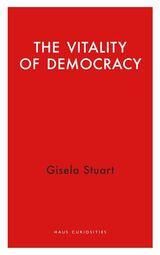286 scholarly books by Haus Publishing and 5
start with V
286 scholarly books by Haus Publishing and 5
286 scholarly books by Haus Publishing
5 start with V start with V
5 start with V start with V

Venice For Lovers
Louis Begley and Anka Muhlstein
Haus Publishing, 2003
Every year for the 30 they have been married, Louis Begley and Anka Mulhstein spend long, enjoyable months in Venice. They write and live there and, over the decades, La Serenissima has become their second home. The owners of their favourite restaurants have become their friends and they share the lives of the locals, far off the beaten tourist tracks, as Mulhstein describes so very charmingly in this book. Louis Begley tells the story of how he fell in love in and with Venice. He is not alone, as his brilliant literary essay on the city’s place in world literature demonstrates: Henry James, Marcel Proust and Thomas Mann are only some of his illustrious predecessors. Mulhstein and Begley’s Venice is a very private view of a place, which will forever inspire dreams of love and passion.
[more]

Versailles 1919
A Centennial Perspective
Alan Sharp
Haus Publishing, 2018
The Versailles Settlement, at the time of its creation a vital part of the Paris Peace Conference, suffers today from a poor reputation: despite its lofty aim to settle the world’s affairs at a stroke, it is widely considered to have paved the way for a second major global conflict within a generation. Woodrow Wilson’s controversial principle of self-determination amplified political complexities in the Balkans, and the war and its settlement bear significant responsibility for boundaries and related conflicts in today’s Middle East. After almost a century, the settlement still casts a long shadow.
Fully revised and updated for the centennial of the Conference, Versailles 1919 sets the ramifications of the Paris Peace treaties—for good or ill—within a long-term context. Alan Sharp mounts a powerful argument that the responsibility for Europe’s continuing interwar instability cannot be wholly attributed to the peacemakers of 1919–23. Concise and convincing, Versailles 1919 is a clear guide to the global legacy of the Versailles Settlement.
Fully revised and updated for the centennial of the Conference, Versailles 1919 sets the ramifications of the Paris Peace treaties—for good or ill—within a long-term context. Alan Sharp mounts a powerful argument that the responsibility for Europe’s continuing interwar instability cannot be wholly attributed to the peacemakers of 1919–23. Concise and convincing, Versailles 1919 is a clear guide to the global legacy of the Versailles Settlement.
[more]

The View from the Hill
Four Seasons in a Walker’s Britain
Christopher Somerville
Haus Publishing, 2021
Collected notes from avid walker Christopher Somerville’s treks through the British countryside.
In Christopher Somerville’s workroom is a case of shelves that holds four hundred and fifty notebooks. Their pages are creased and stained with mud, blood, flattened insects, beer glass rings, smears of plant juice, and gallons of sweat. Everything Somerville has written about walking the British countryside has had its origin in these little black and red books.
During the lockdowns and enforced isolation of the COVID-19 pandemic, Somerville began to revisit this treasury of notes, spanning forty years of exploring on foot. The View from the Hill pulls together the best of his written collections, following the cycle of the seasons from a freezing January on the Severn Estuary to the sight of sunrise on Christmas morning from inside a prehistoric burial mound. In between are hundreds of walks to discover toads in a Cumbrian spring, trout in a Hampshire chalk stream, a lordly red stag at the autumn rut on the Isle of Mull, and three thousand geese at full gabble in the wintry Norfolk sky. Somerville’s writing enables readers to enjoy these magnificent walks without stirring from the comfort of home.
In Christopher Somerville’s workroom is a case of shelves that holds four hundred and fifty notebooks. Their pages are creased and stained with mud, blood, flattened insects, beer glass rings, smears of plant juice, and gallons of sweat. Everything Somerville has written about walking the British countryside has had its origin in these little black and red books.
During the lockdowns and enforced isolation of the COVID-19 pandemic, Somerville began to revisit this treasury of notes, spanning forty years of exploring on foot. The View from the Hill pulls together the best of his written collections, following the cycle of the seasons from a freezing January on the Severn Estuary to the sight of sunrise on Christmas morning from inside a prehistoric burial mound. In between are hundreds of walks to discover toads in a Cumbrian spring, trout in a Hampshire chalk stream, a lordly red stag at the autumn rut on the Isle of Mull, and three thousand geese at full gabble in the wintry Norfolk sky. Somerville’s writing enables readers to enjoy these magnificent walks without stirring from the comfort of home.
[more]

The Vitality of Democracy
Gisela Stuart
Haus Publishing, 2022
A reflection on the current state of and challenges to British democracy.
In The Vitality of Democracy, British-German politician Gisela Stuart argues for the urgency of expanded participation in the democratic process and considers the risks democracy currently faces. Although democracy is rife with difficult choices, she shows that if the people do not appreciate what makes this system work, they risk losing it. While no individual holds the answers, democracy allows for power to change hands, giving opportunities for different sides to have a chance at improving government for all.
Stuart reflects on challenges to British democracy since the mid-2010s. With the United Kingdom exiting the European Union and facing an overwhelming pandemic, restrictions to civil liberties were imposed that may have been unimaginable in the past. It is time to pause and reflect on the serious challenges currently posed to democracy and to the ability of the people to take part.
In The Vitality of Democracy, British-German politician Gisela Stuart argues for the urgency of expanded participation in the democratic process and considers the risks democracy currently faces. Although democracy is rife with difficult choices, she shows that if the people do not appreciate what makes this system work, they risk losing it. While no individual holds the answers, democracy allows for power to change hands, giving opportunities for different sides to have a chance at improving government for all.
Stuart reflects on challenges to British democracy since the mid-2010s. With the United Kingdom exiting the European Union and facing an overwhelming pandemic, restrictions to civil liberties were imposed that may have been unimaginable in the past. It is time to pause and reflect on the serious challenges currently posed to democracy and to the ability of the people to take part.
[more]

Vittorio Orlando
Italy
Spencer Di Scala
Haus Publishing, 2009
The Italian premier Vittorio Orlando came to Paris as one of the 'Big Four', yet in April 1919 walked out in one of the most dramatic crises of the Peace Conferences. Orlando's failure to win for Italy the territories she felt were owed to her was to have far-reaching consequences for both Italy and Europe as a whole. Italy in 1918 was in an ambivalent position: at the outbreak of war the country had been part of the Triple Alliance with Germany and Austria-Hungary, but had stayed neutral until joining the Allies in 1915 on the promise of territorial rewards. The war was a near-disaster for the Italians, culminating in the collapse of their armies at Caporetto in 1917. It was this crisis that brought Orlando to power, and he did much to restore the situation, but the Italians looked to Versailles to compensate them for the terrible losses they had suffered. In this book, the clash between Italy's territorial demands in the Balkans, which had been guaranteed by the Allies in 1915 and earned through her losses in the War, with the new Wilsonian doctrine of open diplomacy and national self-determination is detailed, and it traces the effects the failure of Orlando's delegation to satisfy their people's demands which directly to the rise of Fascism and to Mussolini's policies in the 1930s as he sought to obtain what Italy had been denied at Versailles.
[more]
READERS
Browse our collection.
PUBLISHERS
See BiblioVault's publisher services.
STUDENT SERVICES
Files for college accessibility offices.
UChicago Accessibility Resources
home | accessibility | search | about | contact us
BiblioVault ® 2001 - 2024
The University of Chicago Press









